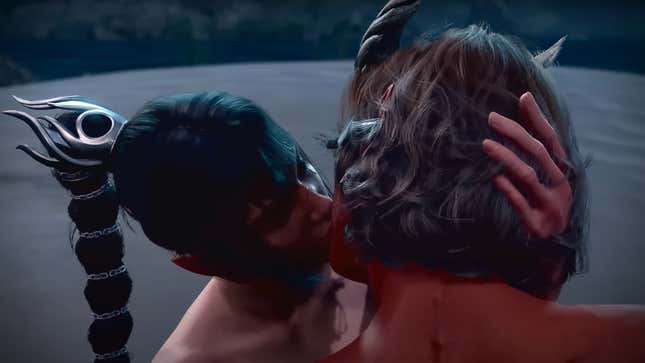
Dungeons & Dragons role-playing game Baldur’s Gate 3 has tough combat and rewarding, deeply tangled plot lines, but I wouldn’t know—I only ever play it when it seems like I might get to kiss someone.
I’ve been “playing” (I use that word very, very loosely here) BG3 exclusively like I’m a Pride & Prejudice (2005) audience member gawking from the couch, hanging onto the game’s approval ratings and hoping that dialogue reveals that what I want is what the characters want. I watch my friend—who’d much rather trample a goblin than find out why Shadowheart’s eyes look so sad—play like normal, and then I swoop in when I sense an opportunity.
“Caress his thighs with the fire poker,” I command my friend’s Dark Urge character, ignoring the sweaty sheen on his coarse dragon skin (making a Dragonborn character wouldn’t have been my first choice). Search Lae’zel’s mind. Is she interested yet?
I need it. I need to know—most other video games are starving me for affection. That is especially true with the kind of games I like playing, anything horrific or medieval, with oak tables stained in gristle and oil and beast blood. But though I enjoy disemboweling Dead Island 2 demons and ruining my Bloodborne character’s hood with gore, there’s a little part of me that always hopes for more. I want to dig and find tenderness glowing under the mud. I think I could have really had something with Rom, the Vacuous Spider. But I feel like mainstream games rarely ever take sex and romance as seriously as I do.
Read More: Baldur’s Gate 3 Players Now Speedrunning Sex
There are plenty of high-fantasy games with sex, like God of War or The Witcher 3. But both assume the straight, male perspective of their protagonists and ideal player, making romance this throwaway thing that requires a maiden craving your big hand to guide her. More inclusive games like Dragon Age: Inquisition and Skyrim at least allow for a variety of relationships, and Final Fantasy X acknowledges that love is real. But these game romances still feel dwarfed by what we’ve been taught is most important: the stereotypically masculine hero’s journey of his rise, and then his trek to an acrid fall.
It’s different in BG3, which treats romance as a natural addition to its storylines and role-playing immersion. That’s what I think romance is supposed to do, make things feel deeper and more valuable. I’ve heard about it in a million Elvis songs, seen it slowly uncurl in a Richard Linklater movie, read about it from shaking hands of old men who became marble statues.
“[Love] walks not upon the earth, nor yet upon the skulls of men, [...] but in the hearts and souls of both gods and men,” Plato says in his philosophical dialogue, Symposium. “Where there is hardness he departs, where there is softness there he dwells.”
Everything has a soft place, including triple-A gaming. Then why does it vulgarize or sideline sex and romance? Like maligned CVS-aisle erotica and a Renée Zellweger chick flick, video game love seems embarrassing because, well, it’s what women like.
And it’s true, I do like it. But I can’t endure another bloodless farming sim marriage just to get it. Baldur’s Gate 3 satisfies me for now, though I do wish it didn’t feel like my only option. Future games, hear me: I’ll be the chosen one, but I don’t want to be alone.